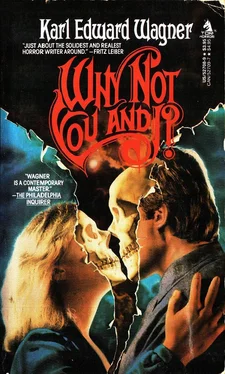As it was, Dark Dreams came out uniformly packaged with Warwick’s much-heralded Trevor Nordgren reprint series. TREVOR NORDGREN Introduces got Nordgren’s name across the cover in letters twice the size of Harrington’s name, and only a second glance would indicate that the book was anything other than the latest Trevor Nordgren novel. But Dark Dreams was the first of Harrington’s books ever to go into a second printing, and Damon tore up the several letters of protest he composed.
He was astonished by Nordgren’s versatility. The Warwick package included a new, expanded edition of Time’s Wanton , a reprint of AcidTest (with a long, nostalgic introduction), a collection of Nordgren’s early short fiction entitled Electric Dreams (with accompanying introductions by the author), as well as Doors of Perception and Younger Than Yesterday — two anthologies of essays and criticism selected from Nordgren’s writings for the Chicago Seed, East Village Other, Berkeley Barb , and other underground newspapers of the ’60s.
Nordgren had by now gathered a dedicated cult following, in addition to the millions who snapped up his books from the checkout counter racks. Virtually any publication with a vintage Trevor Nordgren item in its pages began to command top collector’s prices, Harrington noticed upon browsing through the hucksters’ room at the occasional conventions he attended. Trevor Nordgren had become the subject of interviews, articles, and critical essays in everything from mimeographed fanzines to People to Time. Harrington was amused to find a Trevor Nordgren interview headlining one of the men’s magazines that used to reject stories from them both.
Warwick was delighted with sales figures from the Trevor Nordgren Retrospective, as the reprint package was now dignified, and proudly announced the purchase of five additional titles — two new collections of his short fiction and expanded revisions of his other three Essex House novels. In addition (and in conjunction with McGinnis & Parry as part of a complicated contractual buyout), Nordgren was to edit an anthology of his favorite horror stories (Trevor Nordgren Presents) and would prepare a nonfiction book discussing his personal opinions and theories of horror as a popular genre (The View Through the Glass Darkly).
The Max de Lawrence film of The Rending grossed $60 million in its first summer of release, and The Etching was still on the paperback top ten lists when The Dwelling topped the bestseller charts in the first week. Nordgren’s latest concerned a huge Victorian castle in a small New England town; presumably the mansion was haunted, but Nordgren’s twist was that the mansion had a life of its own and was itself haunting the community. The idea was good for a quarter of a million words, several million dollars, and a complete tax write-off of the high Victorian castle on the Hudson that Nordgren had refurbished and moved into.
Julie Kriegman was fired by the new corporate owners of Summit Books, and the new editor called Krystel Firewind sexist trash and killed the series with #5. Helen Hohenstein broke the news to Harrington somewhat more gently.
“At least Summit paid you.”
Damon’s only immediate consolation was that the call was on Helen’s dime. “Can we sell the series someplace else, or do I wrap sandwiches with the first draft of #6?” Thank God he hadn’t sprung for that word processor Nordgren had urged upon him.
“It doesn’t look good. Problem is that every paperback house that wants to already has one or two swords-and-sorcery series going. Do you think you could write high fantasy? That’s getting to be big just now. You know — lighten up a little on the violence and bare tits, give your imaginary world more of a fairy-tale atmosphere, maybe link in a bunch of Celtic myths and that sort of thing?”
“I can try it.” Harrington imagined Krystel Firewind stripped of sword and armor and a few inches of bustline, gowned in shimmering damask or maybe flowing priestess’ robes.
“Great! Keep this to yourself for now, but Columbine has hired Alberta Dawson away from Warwick to be their senior editor and try to rejuvenate their paperback line. She’s looking for new material, and she owes me. So get me some chapters and a prospectus soonest. Okay?”
“Will do.”
“Oh — and Damon. Plan this as a trilogy, could you?”
Harrington read over a few popular works on Celtic mythology and ancient European history to get some names and plot ideas, then started the rewrite of Krystel Firewind #6. This he was able to flesh out into a trilogy without much difficulty by basing his overall theme on the struggle of Roman Britain against the Saxon invasions. After her sex-change from Desmond Killstar, it was simple enough to transform Krystel Firewind into a half-elfin Druidic priestess. All that was needed was to change names, plug in his characters, and toss in a little magic.
Alberta Dawson was delighted with Tallyssa’s Quest: Book One of The Fall of the Golden Isles . She agreed to a contract for the entire trilogy, and confided to Hohenstein that she’d sensed all along that Damon Harrington was a major literary talent. Tallyssa’s Quest was launched with a major promotional campaign, complete with dump bins and color posters of the book’s cover. The cover, a wraparound by some Italian artist, was a rather ethereal thing depicting a billowingly berobed Tallyssa astride her flying unicorn and brandishing her Star of Life amulet to defend her elfin companions from a horde of bestial Kralkings. Harrington would much rather the cover hadn’t billed him as “The New Tolkien,” but Columbine had paid him his first five-figure advance.
Nordgren phoned him up at 2 in the morning, coked out of his skull, and razzed him about it mercilessly. He was just coming out of a messy paternity suit involving a minor he’d shacked up with at some convention, so Damon gave him an hour of his patience. Since Tallyssa’s Quest had gone into a third printing in its first month, Harrington was not to be baited.
When The Dwelling premiered as a television miniseries, Nordgren was a guest on The Tonight Show. He was obviously wired and kept breaking up the audience with his off-the-wall responses to the standard where-do-you-get-your-ideas sort of questions. Trevor had taken to smoking a pipe, perhaps to keep his hands from shaking, and the designer sunglasses were de rigueur Damon was startled to see how much weight he’d lost. Nordgren managed to get in enough plugs for his new opus, The Coming, to have qualified as a paid political announcement. Harrington had skimmed an advance copy of the thing — it appeared to be a 300,000-word rewrite of Lovecraft’s “The Outsider”—and had pondered the dangers of mixing cocaine and word processors.
There was a major problem with crowd control at the World Science Fiction Convention in Minneapolis, so that they were forced to abandon their tradition of signing books together. The con committee had had to set a special room aside just for Trevor Nordgren. At one point a news reporter counted over 750 fans standing in line to enter the signing room, many with shopping bags filled with Trevor Nordgren books and magazine appearances. Con committee members tried in vain to enforce the one-person-one-autograph rule, and a near riot broke out when uniformed hotel security guards finally escorted Nordgren to his suite after two and a half hours of signing books. Nordgren placated them by promising to set up a second autographing session the next day.
Something that looked like an ex-linebacker in a three-piece suit greeted Harrington when he knocked on the door of Nordgren’s suite. After all the Hammett and Chandler he’d read, Damon felt cheated that he couldn’t see the bulge of a roscoe beneath the polyester, but he surmised one was there.
Читать дальше












